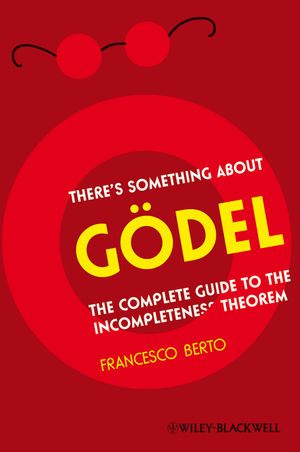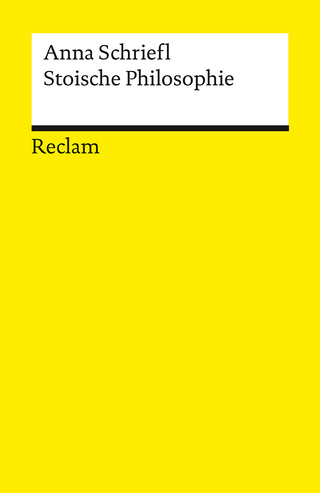
There's Something About Gödel
Wiley-Blackwell (Verlag)
9781405197663 (ISBN)
Berto's highly readable and lucid guide introduces students and the interested reader to Gödel's celebrated Incompleteness Theorem, and discusses some of the most famous - and infamous - claims arising from Gödel's arguments.
Offers a clear understanding of this difficult subject by presenting each of the key steps of the Theorem in separate chapters
Discusses interpretations of the Theorem made by celebrated contemporary thinkers
Sheds light on the wider extra-mathematical and philosophical implications of Gödel's theories
Written in an accessible, non-technical style
Francesco Berto teaches logic, ontology, and philosophy of mathematics at the universities of Aberdeen in Scotland, and Venice and Milan-San Raffaele in Italy. He holds a Chaire d'Excellence fellowship at CNRS in Paris, where he has taught ontology at the École Normale Supérieure, and he is a visiting professor at the Institut Wiener Kreis of the University of Vienna. He has written papers for American Philosophical Quarterly, Dialectica, The Philosophical Quarterly, the Australasian Journal of Philosophy, the European Journal of Philosophy, Philosophia Mathematica, Logique et Analyse, and Metaphysica, and runs the entries “Dialetheism” and “Impossible Worlds” in the Stanford Encyclopedia of Philosophy. His book How to Sell a Contradiction has won the 2007 Castiglioncello prize for the best philosophical book by a young philosopher.
Prologue xi
Acknowledgments xix
Part I: The Gödelian Symphony 1
1 Foundations and Paradoxes 3
1 “This sentence is false” 6
2 The Liar and Gödel 8
3 Language and metalanguage 10
4 The axiomatic method, or how to get the non-obvious out of the obvious 13
5 Peano’s axioms … 14
6 … and the unsatisfied logicists, Frege and Russell 15
7 Bits of set theory 17
8 The Abstraction Principle 20
9 Bytes of set theory 21
10 Properties, relations, functions, that is, sets again 22
11 Calculating, computing, enumerating, that is, the notion of algorithm 25
12 Taking numbers as sets of sets 29
13 It’s raining paradoxes 30
14 Cantor’s diagonal argument 32
15 Self-reference and paradoxes 36
2 Hilbert 39
1 Strings of symbols 39
2 “… in mathematics there is no ignorabimus” 42
3 Gödel on stage 46
4 Our first encounter with the Incompleteness Theorem … 47
5 … and some provisos 51
3 Gödelization, or Say It with Numbers! 54
1 TNT 55
2 The arithmetical axioms of TNT and the “standard model” N 57
3 The Fundamental Property of formal systems 61
4 The Gödel numbering … 65
5 … and the arithmetization of syntax 69
4 Bits of Recursive Arithmetic … 71
1 Making algorithms precise 71
2 Bits of recursion theory 72
3 Church’s Thesis 76
4 The recursiveness of predicates, sets, properties, and relations 77
5 … And How It Is Represented in Typographical Number Theory 79
1 Introspection and representation 79
2 The representability of properties, relations, and functions … 81
3 … and the Gödelian loop 84
6 “I Am Not Provable” 86
1 Proof pairs 86
2 The property of being a theorem of TNT (is not recursive!) 87
3 Arithmetizing substitution 89
4 How can a TNT sentence refer to itself? 90
5 γ 93
6 Fixed point 95
7 Consistency and omega-consistency 97
8 Proving G 1 98
9 Rosser’s proof 100
7 The Unprovability of Consistency and the “Immediate Consequences” of G1 and G2 102
1 G 2 102
2 Technical interlude 105
3 “Immediate consequences” of G1 and G 2 106
4 Undecidable 1 and undecidable 2 107
5 Essential incompleteness, or the syndicate of mathematicians 109
6 Robinson Arithmetic 111
7 How general are Gödel’s results? 112
8 Bits of Turing machine 113
9 G1 and G2 in general 116
10 Unexpected fish in the formal net 118
11 Supernatural numbers 121
12 The culpability of the induction scheme 123
13 Bits of truth (not too much of it, though) 125
Part II: The World after Gödel 129
8 Bourgeois Mathematicians! The Postmodern Interpretations 131
1 What is postmodernism? 132
2 From Gödel to Lenin 133
3 Is “Biblical proof” decidable? 135
4 Speaking of the totality 137
5 Bourgeois teachers! 139
6 (Un)interesting bifurcations 141
9 A Footnote to Plato 146
1 Explorers in the realm of numbers 146
2 The essence of a life 148
3 “The philosophical prejudices of our times” 151
4 From Gödel to Tarski 153
5 Human, too human 157
10 Mathematical Faith 162
1 “I’m not crazy!” 163
2 Qualified doubts 166
3 From Gentzen to the Dialectica interpretation 168
4 Mathematicians are people of faith 170
11 Mind versus Computer: Gödel and Artificial Intelligence 174
1 Is mind (just) a program? 174
2 “Seeing the truth” and “going outside the system” 176
3 The basic mistake 179
4 In the haze of the transfinite 181
5 “Know thyself”: Socrates and the inexhaustibility of mathematics 185
12 Gödel versus Wittgenstein and the Paraconsistent Interpretation 189
1 When geniuses meet … 190
2 The implausible Wittgenstein 191
3 “There is no metamathematics” 194
4 Proof and prose 196
5 The single argument 201
6 But how can arithmetic be inconsistent? 206
7 The costs and benefits of making Wittgenstein plausible 213
Epilogue 214
References 217
Index 225
| Erscheint lt. Verlag | 6.11.2009 |
|---|---|
| Verlagsort | Hoboken |
| Sprache | englisch |
| Maße | 160 x 239 mm |
| Gewicht | 526 g |
| Themenwelt | Geisteswissenschaften ► Philosophie ► Allgemeines / Lexika |
| Geisteswissenschaften ► Philosophie ► Philosophie der Neuzeit | |
| Mathematik / Informatik ► Mathematik ► Logik / Mengenlehre | |
| ISBN-13 | 9781405197663 / 9781405197663 |
| Zustand | Neuware |
| Informationen gemäß Produktsicherheitsverordnung (GPSR) | |
| Haben Sie eine Frage zum Produkt? |
aus dem Bereich


